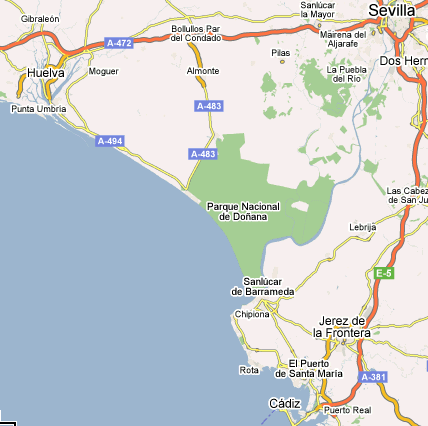Adolph Schulten
Doñana Marshes *
 The Doñana Marshes, a National Park in the valley of the Andalusian Guadalquivir River was linked with Atlantis over 400 years ago by José Pellicer. During the 1920’s George Bonsor and Adolph Schulten searched the area for evidence of Tartessos. After that interest in the marshes waned until a few years ago when Werner Wickboldt identified circular and rectangular features in the Park from satellite images, which he claimed a possibly Atlantean.
The Doñana Marshes, a National Park in the valley of the Andalusian Guadalquivir River was linked with Atlantis over 400 years ago by José Pellicer. During the 1920’s George Bonsor and Adolph Schulten searched the area for evidence of Tartessos. After that interest in the marshes waned until a few years ago when Werner Wickboldt identified circular and rectangular features in the Park from satellite images, which he claimed a possibly Atlantean.
Richard Freund, a professor from the University of Hartford, claims to have led a team to study the area and has had work included in a March 2011 National Geographic documentary, Finding Atlantis. However, Spanish anthropologist Juan Villarias-Robles who has worked on the site for some years has declared(a) that Freund did not lead the investigations on the site and in fact spent less than a week there. Wickboldt’s images turned out to be either smaller than expected or were from the Muslim period. Evidence for Tartessos or Atlantis has not been found.
(a) Muddying up Atlantis – Roger Catlin | TV Eye (archive.org) or see Archive 2122*
German Atlantology
German Atlantologists have made a considerable contribution to their subject over the past century. In fact, outside the English speaking world the Germans can arguably claim to have contributed most to scientific Atlantology. I think that there is sufficient material to justify a book on German Atlantology on its own. The extent of their influence can be gauged by entering ‘German’ in the Atlantipedia search box.
A recent newsletter from Thorwald C. Franke highlighted the work of German researchers, particularly in the early part of the 20th century. Surprisingly, he did not mention more recent German publications including his own(a) valuable contributions. In 2016 Franke published Kritische Geschichte der Meinungen und Hypothesen zu Platons Atlantis[1255] (Critical history of opinions and hypotheses about Plato’s Atlantis), which contains a review of virtually every Atlantis theorist from antiquity until the 20th century. Unfortunately, this 593-page tome is not available in English leaving German readers to be envied for having such a valuable research tool available to them. A summary of his book is available in English(b).
*So it is not without good reason that Franke recently urged serious Atlantis researchers to learn German as it provides access to a lot of valuable research.*
(a) https://www.atlantis-scout.de/atlanveroeff_engl.htm
(b) https://www.atlantis-scout.de/atlantis-geschichte-hypothesen.htm
*Also See: Aschenbrenner, Beier, Bischoff, L. Borchardt, P. Borchardt, Christ, Hausmann, Hofmann, Horn,
Hübner, Huf, Jessen, Kühne, Muck, Richter, Schoppe, Schulten, Spanuth and Tributsch.*
